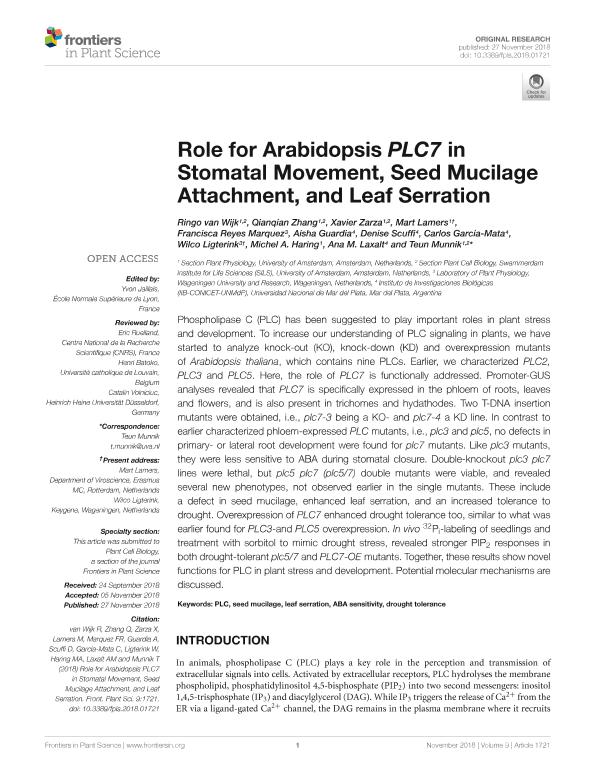Artículo
Role for arabidopsis PLC7 in stomatal movement, seed mucilage attachment, and leaf serration
van Wijk, Ringo; Zhang, Qianqian; Zarza, Xavier; Lamers, Mart; Reyes Marquez, Francisca; Guardia, Aisha Elena ; Scuffi, Denise
; Scuffi, Denise ; Garcia-Mata, Carlos
; Garcia-Mata, Carlos ; Ligterink, Wilco; Haring, Michel A.; Laxalt, Ana Maria
; Ligterink, Wilco; Haring, Michel A.; Laxalt, Ana Maria ; Munnik, Teun
; Munnik, Teun
 ; Scuffi, Denise
; Scuffi, Denise ; Garcia-Mata, Carlos
; Garcia-Mata, Carlos ; Ligterink, Wilco; Haring, Michel A.; Laxalt, Ana Maria
; Ligterink, Wilco; Haring, Michel A.; Laxalt, Ana Maria ; Munnik, Teun
; Munnik, Teun
Fecha de publicación:
27/11/2018
Editorial:
Frontiers Media S.A.
Revista:
Frontiers in Plant Science
ISSN:
1664-462X
Idioma:
Inglés
Tipo de recurso:
Artículo publicado
Clasificación temática:
Resumen
Phospholipase C (PLC) has been suggested to play important roles in plant stress and development. To increase our understanding of PLC signaling in plants, we have started to analyze knock-out (KO), knock-down (KD) and overexpression mutants of Arabidopsis thaliana, which contains nine PLCs. Earlier, we characterized PLC2, PLC3 and PLC5. Here, the role of PLC7 is functionally addressed. Promoter-GUS analyses revealed that PLC7 is specifically expressed in the phloem of roots, leaves and flowers, and is also present in trichomes and hydathodes. Two T-DNA insertion mutants were obtained, i.e., plc7-3 being a KO- and plc7-4 a KD line. In contrast to earlier characterized phloem-expressed PLC mutants, i.e., plc3 and plc5, no defects in primary- or lateral root development were found for plc7 mutants. Like plc3 mutants, they were less sensitive to ABA during stomatal closure. Double-knockout plc3 plc7 lines were lethal, but plc5 plc7 (plc5/7) double mutants were viable, and revealed several new phenotypes, not observed earlier in the single mutants. These include a defect in seed mucilage, enhanced leaf serration, and an increased tolerance to drought. Overexpression of PLC7 enhanced drought tolerance too, similar to what was earlier found for PLC3-and PLC5 overexpression. In vivo 32Pi-labeling of seedlings and treatment with sorbitol to mimic drought stress, revealed stronger PIP2 responses in both drought-tolerant plc5/7 and PLC7-OE mutants. Together, these results show novel functions for PLC in plant stress and development. Potential molecular mechanisms are discussed.
Palabras clave:
PLC
,
SEED MUCILAGE
,
LEAF SERRATION
,
ABA SENSITIVITY
,
DROUGHT TOLERANCE
Archivos asociados
Licencia
Identificadores
Colecciones
Articulos(IIB)
Articulos de INSTITUTO DE INVESTIGACIONES BIOLOGICAS
Articulos de INSTITUTO DE INVESTIGACIONES BIOLOGICAS
Citación
van Wijk, Ringo; Zhang, Qianqian; Zarza, Xavier; Lamers, Mart; Reyes Marquez, Francisca; et al.; Role for arabidopsis PLC7 in stomatal movement, seed mucilage attachment, and leaf serration; Frontiers Media S.A.; Frontiers in Plant Science; 9; 1721; 27-11-2018; 1-16
Compartir
Altmétricas



